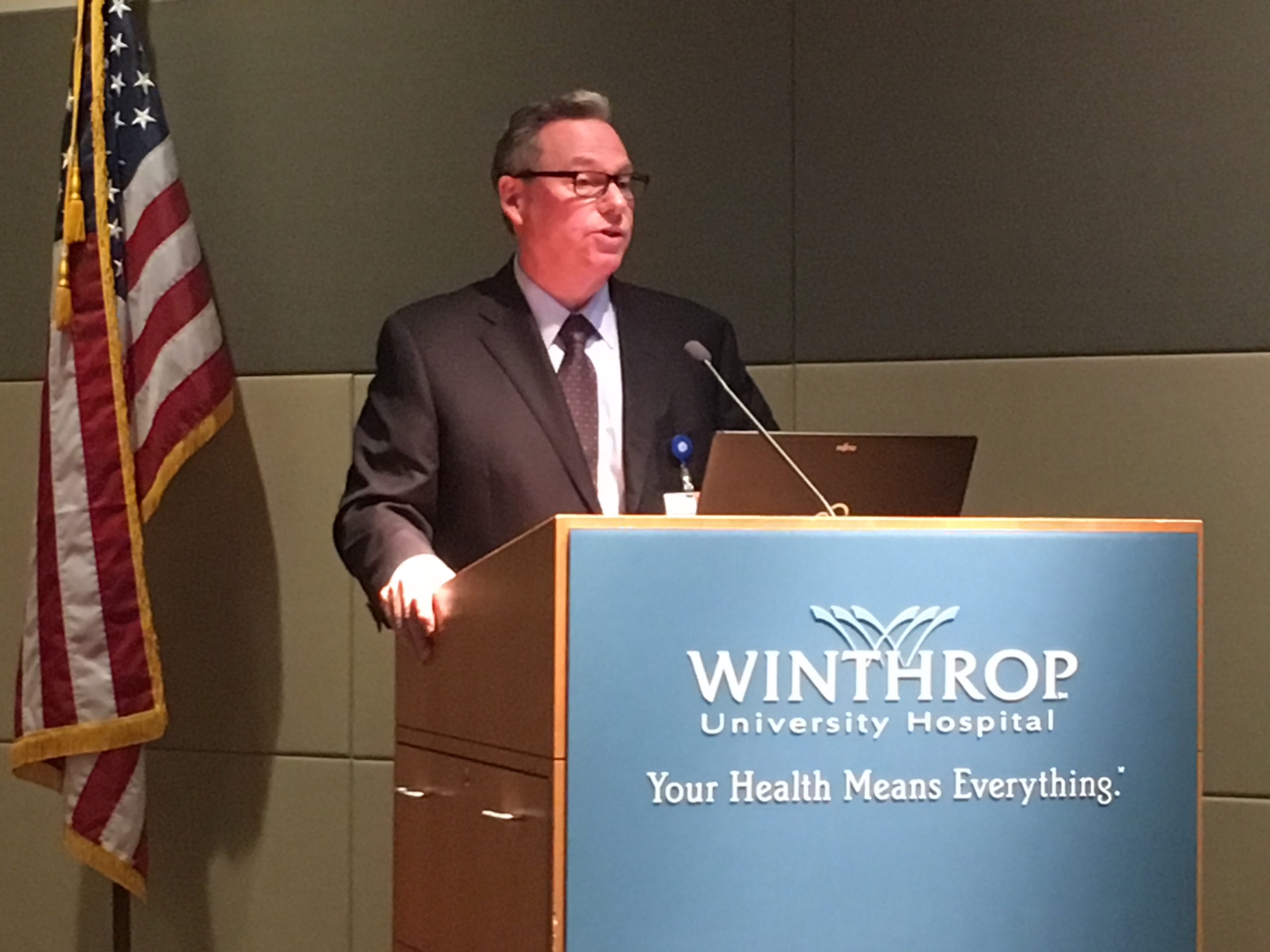Winthrop-University Hospital is planning a multimillion-dollar expansion of its downtown Mineola campus as demand for many of its services continues to grow, hospital officials said last week.
The hospital plans to start work as early as this spring on additions to its emergency room and maternity wing, and will tear down nine nearby houses it owns to make way for a 200-space parking lot, John Collins, the president and CEO, said.
The $99.5 million worth of work has become necessary as the hospital has seen a significant uptick in the past several years as the population ages, Collins said.
Emergency room visits, for example, increased to about 75,000 in 2016 from 66,000 in 2010. Ambulatory surgery operations, in which patients undergo surgery and go home the same day, increased to 25,000 from 18,000 in the same period.
“This is something that’s difficult to deal with, is all of the volume,” Collins said during a presentation to about 40 Mineola residents last Wednesday.
The $85 million maternity wing expansion would add two floors to the existing facility, one with private rooms for new mothers and another with 24 medical and surgical beds.
Adding 18 beds to the emergency room for $12.5 million would help reduce overcrowding in a facility originally built for about 40,000 annual visits, Collins said.
The $2 million expansion of the parking lot at First Street and Fleet Place would replace six homes on Fleet Place and three on DeMott Street that house medical interns and residents working at the hospital, Collins said.
The lot would help ease parking congestion for the hospital’s medical staff, which has grown by 45 percent since 2008, Collins said.
The plans include landscaping and architectural designs aimed at maintaining the neighborhood’s character and giving the hospital campus a unified appearance, Collins said.
Winthrop was planning these projects before its merger with NYU Langone Medical Center, expected to be finalized early this year, Collins said.
But that partnership will allow more expansion in the future, as NYU Langone has the resources to possibly build a second hospital south of the Long Island Rail Road tracks and a parking garage over the existing public lot at the corner of First Street and Third Avenue, Collins said.
The partnership will also give Winthrop some stability as U.S. lawmakers move toward the repeal of the Affordable Care Act, which would cause major changes for the healthcare industry, he said.
“It’s very difficult for a hospital like Winthrop to just be a stand-alone hospital,” Collins said. “We now have a big brother, if you will.”
The projects still need approval for an exception to zoning rules from Mineola’s village board.
They will not affect the village’s property tax base because Winthrop pays a flat amount of taxes under an agreement with the village for its new medical research center, which opened last year, Collins said.
Some village residents last week said they worry hospital employees would continue parking on the street in the surrounding residential area, leaving neighbors to struggle to find parking places.
“You may say there’s parking there, but your employees are parking all over the village,” one resident said.
Some were also concerned the expanded lot would lead to increased traffic congestion along First Street, which they said is already a problem during rush hours.
But Collins and other hospital officials said the lot would help alleviate that congestion. Most employees using it would be coming at “off-shift” times later in the morning, not during the rush hours, they said.
Dennis Sheridan, Winthrop’s vice president for administration, said the hospital would encourage employees to use the parking provided for them, not village streets.
More hospital parking spaces could help solve the problem, he said.
“If we don’t have capacity, it’s human nature — they are going to seek” parking spots elsewhere, Sheridan said.



